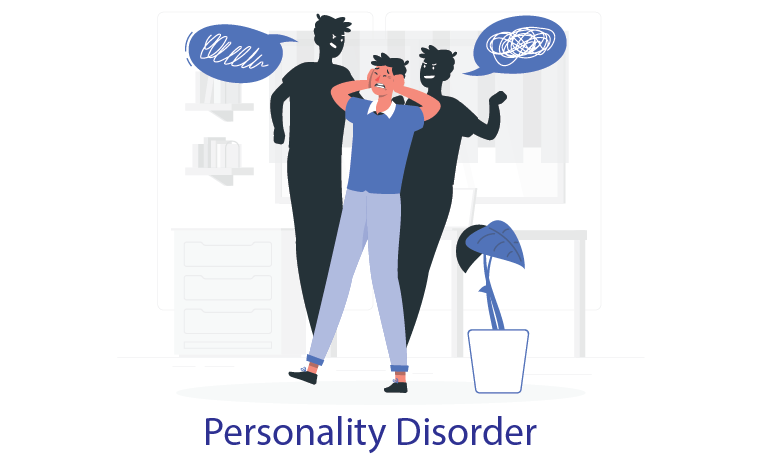Introduction:
Personality disorders are a category of mental health conditions characterized by enduring patterns of thought, behavior, and inner experience that deviate significantly from the expectations of the individual’s culture. These patterns often manifest in a wide range of situations and can cause distress or impairment in personal, social, and occupational functioning. While everyone may exhibit occasional eccentricities or behaviors that deviate from societal norms, personality disorders involve more pervasive and inflexible patterns that can have a profound impact on an individual’s life.

Types of Personality Disorders:
The Diagnostic and Statistical Manual of Mental Disorders, Fifth Edition (DSM-5), classifies personality disorders into three clusters: Cluster A (odd or eccentric disorders), Cluster B (dramatic, emotional, or erratic disorders), and Cluster C (anxious or fearful disorders). Each cluster encompasses specific disorders with distinct characteristics.
- Cluster A Disorders:
- Paranoid Personality Disorder: Characterized by pervasive distrust and suspicion of others.
- Schizoid Personality Disorder: Involves detachment from social relationships and a limited range of emotional expression.
- Schizotypal Personality Disorder: Features eccentric behavior, peculiar thoughts, and difficulties forming close relationships.
- Cluster B Disorders:
- Antisocial Personality Disorder: Involves a disregard for others’ rights, deceitfulness, impulsivity, irritability, aggression, and lack of remorse.
- Borderline Personality Disorder: Marked by unstable relationships, self-image, and emotions, as well as impulsive and self-destructive behaviors.
- Histrionic Personality Disorder: Characterized by attention-seeking, excessive emotionality, and a need for approval.
- Narcissistic Personality Disorder: Involves a grandiose sense of self-importance, a lack of empathy, and a preoccupation with fantasies of unlimited success.
- Cluster C Disorders:
- Avoidant Personality Disorder: Features social inhibition, feelings of inadequacy, and hypersensitivity to negative evaluation.
- Dependent Personality Disorder: Characterized by an excessive need to be taken care of, leading to submissive and clingy behavior.
- Obsessive-Compulsive Personality Disorder: Involves preoccupation with orderliness, perfectionism, and control at the expense of flexibility and openness.

Causes and Risk Factors:
The exact causes of personality disorders are complex and multifaceted. A combination of genetic, environmental, and neurobiological factors may contribute to their development. Childhood experiences, such as trauma, neglect, or inconsistent parenting, are often implicated in the onset of personality disorders. Additionally, genetic predispositions and alterations in brain structure and function may play a role.
Diagnosis and Treatment:
Diagnosing personality disorders can be challenging, as individuals with these conditions often do not seek treatment willingly. The diagnosis typically involves a thorough assessment of the individual’s history, behavior, and interpersonal relationships. Treatment approaches vary but often include psychotherapy, medication, and support from mental health professionals. Cognitive-behavioral therapy (CBT), dialectical behavior therapy (DBT), and medications like mood stabilizers or antipsychotics may be employed, depending on the specific disorder and its symptoms.
Conclusion:
Personality disorders pose significant challenges for individuals affected by them and those around them. Understanding these conditions is crucial for fostering empathy and promoting effective interventions. Early detection and appropriate treatment can improve the quality of life for individuals with personality disorders and help them navigate relationships and daily life more successfully. Research and ongoing efforts in the field of mental health continue to refine our understanding of these complex conditions, offering hope for better treatment options and outcomes in the future.



It is a wonderful website with an attractive design. Thank you for the valuable information. We would be pleased if you provided valuable information within your specialty centered around pets and animals
.